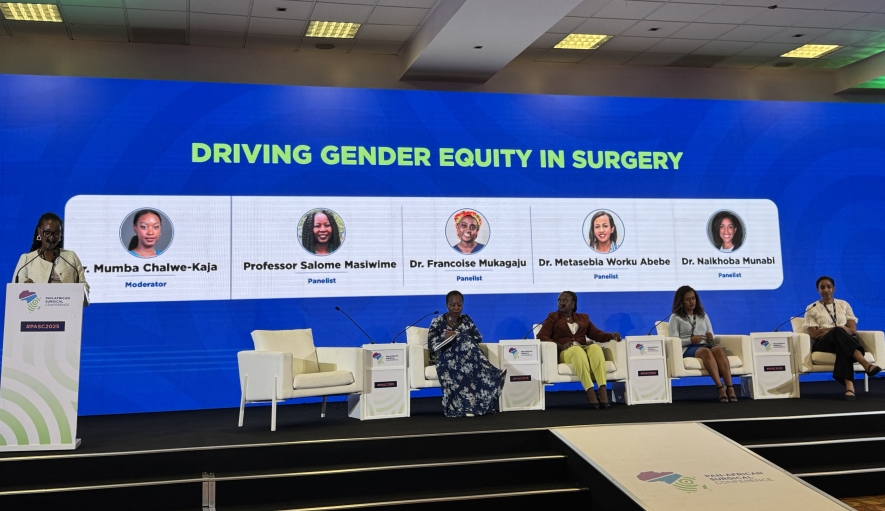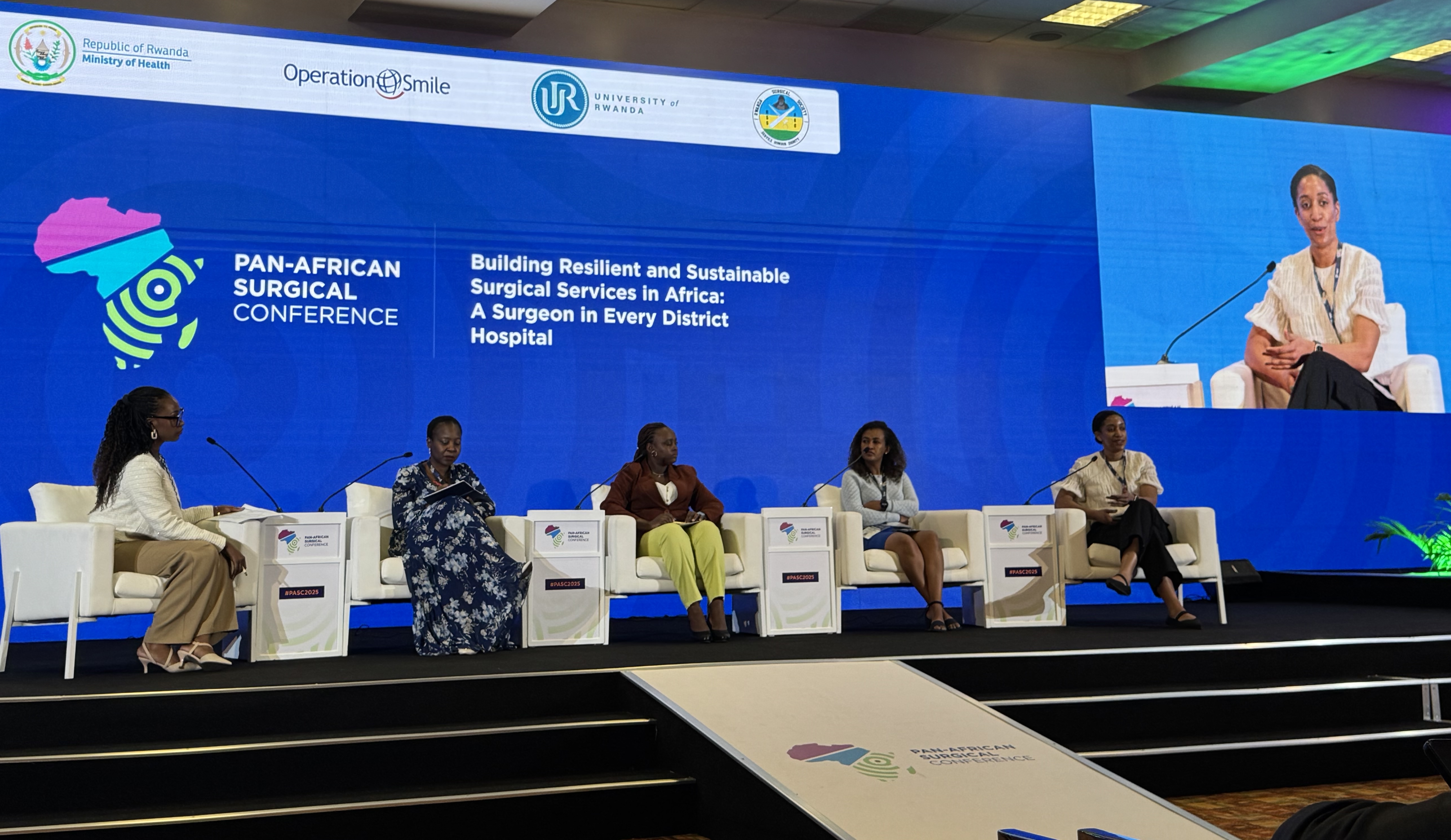Pediatric craniofacial plastic surgeon Naikhoba Munabi, MD, MPH, recently returned from the inaugural Pan-African Surgical Congress in Kigali, Rwanda. As a panelist on gender equity in surgical care, she joined pioneering women surgeons from across the continent to discuss challenges, progress, and the power of collaboration.
We sat down with Dr. Munabi to hear more about the conference, her path in global surgery, and the innovations transforming craniofacial care.
Let’s start with the Congress itself. What was it, and how did you get involved?
This was the first-ever Pan-African Surgical Congress, and it was held in Kigali. There were over 700 or 800 people there from all over Africa and the world. It was a great conference. There was research, and there were discussions about the challenges in increasing healthcare workforce capacity and surgical quality in low- and middle-income countries, particularly in Africa.
I was invited to be on a panel about gender equity in surgery based on some of the work I’d done previously with Operation Smile and their Women in Medicine initiative. I helped launch that program in 2020, and it’s since grown into something they now run in almost every country where they work.
Operation Smile has evolved from episodic cleft lip and palate surgeries into a broader health system-strengthening organization. They now run in-country centers for year-round care and offer training in burn surgery, microsurgery, hand surgery, and more.

Can you talk more about your background in global surgery and how you became interested in gender equity within that context?
Global surgery is a newer field—it really only emerged about 10 years ago. But it’s built around a staggering reality: 5 billion people worldwide lack access to safe and affordable surgical care. That’s the majority of the global population. It’s something that affects people in low- and middle-income countries, of course, but it also affects people right here in the U.S. Even in New York City, people struggle to access surgical care.
During my training, I took two years to get a Master of Public Health with a focus on global health. I also worked as a global surgery fellow with Operation Smile. I did impact assessments of their existing programs and needs-based assessments to guide the development of new ones.
And while I was doing that, I noticed something: everywhere I went, there was a really accomplished, strong woman working hard to help her community. So I started thinking about how gender equity fits into this. We talk a lot about the shortage of healthcare workers—we need 18 million more providers to meet the global need. Where do we find them? Well, the largest untapped labor pool in many low-resource settings is women. Most people not currently contributing to the economic workforce are women.
That’s where Women in Medicine came from. We wanted to celebrate the achievements of women already in the system and also explore patient perspectives on women in healthcare, while creating mentorship and leadership opportunities for both groups.
Tell us more about the gender equity panel. Who was there, and what was the conversation like?
I was on a panel with four other very incredible women. Almost all of them were the first female surgeons in their respective specialties and countries. We had the first female plastic surgeon in Ethiopia, the first in Rwanda, the first female urologist from Zambia, and an obstetrician-gynecologist from South Africa who has done a lot of work in global surgery and gender equity.
We talked about why gender equity matters, what steps are being taken to improve it in different countries, some of the challenges we’ve faced, and where we go next.
Were there particular questions that stood out or challenged you?
One of the questions that was most surprising—and perhaps challenging—was: Who gets to talk about gender equity? I sort of alluded to this before, but is it that the people most suffering from inequity, i.e., women, should be the ones talking about it? Or should we get input from everyone, even those on the “positive” side of that imbalance?
In my opinion, the more people you can involve in a conversation, the more the topic of discussion will get out there. My colleagues on the panel—many of them were the first female surgeons in their specialty in their country. That means there had to have been a male colleague who saw them, believed in them, and supported them. Allyship can be really powerful.
Did anything about this panel feel different from gender equity conversations you’ve seen in the U.S.?
Absolutely. A lot of times in the U.S., panels on gender or diversity are tucked away in side rooms at 7 a.m., and the only people who show up are the ones already familiar with the issue. That makes it harder for the information to reach the people who need to hear it.
What was really exciting about this panel was that it was part of the main program. The whole audience—men and women—was there. And there were amazing questions from our male colleagues. People asked, “What can we do to help support this work?” and “What are the barriers you’re seeing that we might be able to address?” Some even asked to be more engaged in future discussions. That level of engagement was inspiring.

Did you notice any cultural or structural differences in how gender equity shows up across countries?
Some aspects are similar. In many countries, women still take on the majority of responsibility for child-rearing and household management, which makes it really hard to balance with a demanding surgical career.
But there are differences too. In many low- and middle-income countries, families live in multi-generational homes. There’s more built-in community support, which can make a big difference. Some of the panelists talked about that—that they felt bolstered by their communities in ways that helped them keep going.
There’s also something called the Global Gender Gap Index, which looks at four pillars: education, health, political empowerment, and economic participation. If you look at the rankings, you might be surprised. Rwanda, for instance, ranks extremely highly in political empowerment and health. So there’s a lot we can learn from one another.
What do you want people to take away from your experience at the Congress?
That we need to be having these conversations more often, and not in whispered corners, people think gender is controversial, but it’s really no more controversial than a debate about surgical technique. Every craniofacial meeting has people arguing about straight-line versus furlow palatoplasty. But when it comes to interpersonal dynamics, people get shy.
You can’t make progress if you avoid hard conversations. The fact that this was the first Pan-African Surgical Congress—and that they chose to highlight gender equity on the main stage, with the Prime Minister of Rwanda in attendance—says something. It was a huge platform. And they used it to elevate a conversation that matters.
Do you think Columbia’s role in global surgery will continue to grow?
Yes. I don’t think our involvement is going to be a one-off. This was one event, but there are many people at Columbia who understand how important this work is. I’ve gotten a lot of support from my department and from Dr. Christine Rohde [Chief of Plastic Surgery] in particular.
Global health has always been something Columbia values. But the perspective is shifting. It's no longer about flying in, doing some surgeries, patting ourselves on the back, and leaving. It's about mentorship, education, and collaboration. I was just in Tanzania last week with a neurosurgeon from Cornell, teaching about craniosynostosis. They’ve done incredible work there in spine and trauma, and now we’re exploring plastic surgery collaborations, too.
There’s so much potential when we approach these relationships with humility and respect. There’s a lot to gain on both ends.
Related:
- The Modern International Surgical Mission Starts Local and Stays Local
- Bringing Life-Saving Heart Surgery to Children in Nigeria
- Caracas to Santo Domingo: Creating Access to Pediatric Liver Transplant from the Ground, Up

